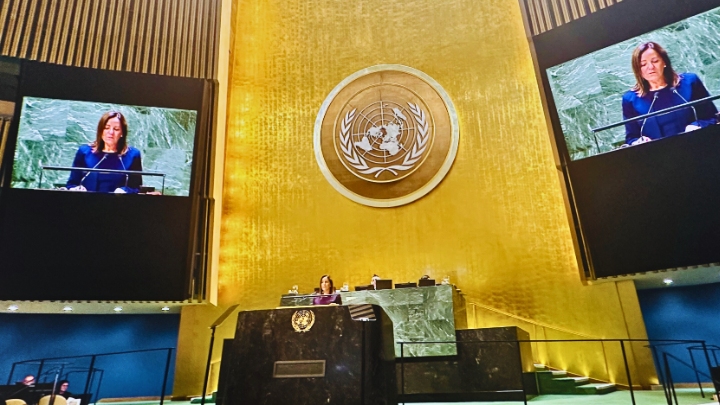President Gatti Santana addresses United Nations General Assembly

The President of the International Residual Mechanism for Criminal Tribunals (Mechanism), Judge Graciela Gatti Santana, today presented the Mechanism’s eleventh annual report to the United Nations General Assembly in New York.
At the outset, President Gatti Santana was pleased to announce that the Mechanism has reached a critical juncture in its lifespan, with no more active trials or appeals in relation to the core crimes incorporated in its Statute. This follows decisive developments in the cases of Prosecutor v. Stanišić & Simatović and Prosecutor v. Félicien Kabuga, including a decision of the Appeals Chamber in the latter case that has “triggered the Mechanism’s truly residual mode.”
President Gatti Santana reported that the resulting shift in the Mechanism’s attention, from in-court proceedings to longer-term mandated functions, is coupled with a need “to think and do things differently”. She underscored that, while the Mechanism is not closing down and still has much to do, it must start to redefine the way it works. Against this backdrop, President Gatti Santana indicated that she had recalibrated her own key objectives, to better reflect the Mechanism’s new reality.
President Gatti Santana then proceeded to announce the three new priorities of her Presidency, as follows:
First, to present the Security Council with a framework of operations to complete functions during the Mechanism’s new residual phase. President Gatti Santana explained that this responds to Security Council resolution 2637 (2022) and is intrinsically connected with the Mechanism’s future-planning activities. As part of this priority, she will also be focusing on areas of activity where potential restructuring might help to avoid duplication of efforts and deliver greater efficiencies.
Second, to promote effective leadership and good governance in the performance of mandated functions and residual activities. Here, President Gatti Santana emphasised that those in senior and leadership positions within the Mechanism must be vigilant in managing with transparency, efficiency, and accountability. She spoke of the challenges of leading a downsizing institution and keeping productivity high when morale is low, and mentioned the key role of management in helping ensure that the Mechanism remains a functional and thriving organisation.
And third, to continue consolidating the legacy of the ad hoc tribunals and the Mechanism and working closely with all main stakeholders. In relation to this priority, President Gatti Santana highlighted the Mechanism’s support to national jurisdictions and the importance of ensuring that the public judicial records of the ICTY, the ICTR, and the Mechanism are as accessible as possible, including through the establishment of information centres in accordance with Security Council resolution 1966 (2010).
Having affirmed the Mechanism’s commitment to cooperating with its key stakeholders, President Gatti Santana observed that the Mechanism, in turn, relies heavily on the support provided by Member States and others. In this context, she identified a number of areas where there is a pressing need for further cooperation, namely: the situation of the relocated persons in the Republic of Niger, who remain under de facto house arrest; the failure of the Republic of Serbia to arrest and transfer the accused in the Jojić & Radeta contempt matter; and the enforcement of sentences, where the Mechanism urgently requires enhanced assistance from States.
In closing, President Gatti Santana recalled the importance of working together to deliver on the promise of justice, stating: “It now falls upon all of us to ensure that the Mechanism can carry on towards the final chapter of this historic mission and secure the precious legacies of all three institutions, for the benefit of generations to come”.
President Gatti Santana is in New York to report on the Mechanism’s activities in accordance with Article 32(1) of the Statute of the Mechanism.